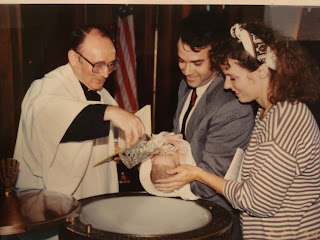 |
In this fictional scene, Jesus and
Mary are historical figures.
|
At Christmas time, if you live in the States, you’re liable to see nativity creches on display on church property and sometimes on city property. Mary, Joseph, and a motley crew surround a feeding trough, in which lies the holy infant. There’s a church near my place that brings in a live camel, which is pretty cool as religious traditions go. The Christmas creche reportedly originated with Francis of Assisi in the 1200s, when it was well understood that the child in the trough was God. Today, however, there are conflicting opinions about how one should interpret Jesus as a historical figure. If you’re not the sort who’s grateful to Jesus for your eternal salvation, let me suggest a down-to-earth reason to remember Baby Jesus this Christmas season. Thank him for universal literacy. Jesus was Jewish, and that meant he was devoted to the written word in a way that no fatherless laborer in any gentile land would have been. Through the Jewish sect that Jesus founded, he passed along the Jews’ love of literacy to Europe and beyond.
Jews of Jesus’ day were known for their holy book, which commanded the respect of the Romans. While pagan religions were largely ceremonial, Judaism featured the synagogue, where the community gathered and heard the word of the LORD read aloud. The center of the religion was not an idol but the written Law (Torah). Most Jews at the time were still illiterate, as Jesus probably was, but they demonstrated a remarkable devotion to scripture.
Jesus founded a Jewish sect that survived after his execution. The sect really took off once Paul, a Hellenized Jew, convinced the leaders in Jerusalem to accept non-Jews into the movement. Paul personally took the “good word” to the gentiles, spreading Jewish scripture along with faith in Christ. Soon his own letters were being copied to be read aloud in Christian assemblies across the Roman Empire. Then, one by one, anonymous Christians composed the gospels, including many noncanonical ones. Soon Christians were busy copying texts and distributing them far and wide. They copied so many texts that they established the codex as a popular new written medium. Unlike a scroll, the codex had separate pages stacked on top of each other, bound together along one edge. Yes, early Christianity gave us the book.
When Christianity turned into Rome’s official religion, it replaced ancient religious practices that were cultic and ceremonial, with no holy books comparable to the Christians’ newly expanded Bible. This was before the Dark Ages, and Christianity lived peacefully alongside the intellectual, literate tradition of the ancient world. For example, Christians considered people in India to be saved if they adhered to the Word of God as the Buddha had preached it, presuming that the Word had inspired people all over the world.
When Rome fell and the Latin-speaking West fell with it, Western Christianity entered the Dark Ages. With civilization in ruin, the schools were closed, and intellectual life collapsed. Later, Christian missionaries from Ireland brought a superstitious version of Christianity to mainland Europe. That’s where you get Purgatory, which you could reportedly locate if you went into a particular cave in Ireland. The Mass, said in Latin rather than the vernacular, sounded like magical incantations. The Bible was rarely translated into the common tongue.
Despite the decline of the Church, it still supported literacy. With the fall of Rome, the Church became the only international institution in the West and the sole preserver of books and literacy. Churchmen were commonly among the first people to leave written records in a language with no previous literature. Sometimes the Christians provided a language with its first alphabet. Wherever Christians spread their faith, they spread literacy. As in the early days, churchmen hand-copied a lot of texts over the centuries. A “cleric” is a “clerk,” someone who reads, writes, and does numbers. Commoners went to the clergy for help with written documents. The Church Council of 1179 mandated free Latin instruction at cathedrals to benefit poor scholars, combining Christianity’s interest in charity and literacy. This practice soon developed into Europe’s first universities.
As civilization recovered, the Church continued to support learning. Copernicus, for example, was funded by the Church. The first book printed on Gutenberg’s press was a Bible. With that technology, the Bible was translated into every major European language and printed in large numbers. Martin Luther’s challenge to the Church was a written tract, one that was soon printed up and distributed. The Reformers emphasized that Christians should be able to read the Bible themselves, all the way down to the simple plowman in his field. Rather naively, Martin Luther thought that everyone would naturally interpret the Bible his way if only they had a chance, and he translated the Bible into German to give that chance to more people. The ideal medieval Christian listened to church authority, but the ideal Reformation Christian had read the Bible for themselves. In Denmark, Protestant ministers taught the peasants to read and write, which allowed the peasantry to participate in the politics of their kingdom, perhaps for the first time anywhere in the world. Sunday school, an institution hated by children from Tom Sawyer to me, began in the 1780s as an effort to teach poor children to read. It had to be on Sunday because the kids would be working the other six days. Today we take it for granted that a public school is going to teach kids to read for free. Historically speaking, however, a culture’s ruling power structure usually hasn’t wanted the commoners to be able to read. Literacy might let them read laws for themselves, draw up proper legal documents, sue in court, and pass along subversive messages. Universal literacy began as a Christian project. Across the globe, missionaries opened schools and even taught girls to read. Today universal literacy is a secular ideal, but the original momentum was Christian.
What was Jesus’ role in all this? Jesus didn’t do much directly to promote literacy, but he did say things that were noteworthy enough that others wrote them down. He also led a life that was so dramatic that early Christians invented a new literary form to narrate that life: the “gospel.” Somehow he expressed the humanism and piety of his Jewish tradition in such an arresting and accessible way that it appealed to Paul, a Hellenized Jew, and to the gentiles among whom Paul lived. Jesus’ predominant contribution to world literacy was that he founded a sect that would metamorphose into a world religion, and that he was Jewish. That seems to have been enough to get the ball rolling toward universal literacy. So the next time you drive past a nativity creche, thank Baby Jesus for our literate culture.









